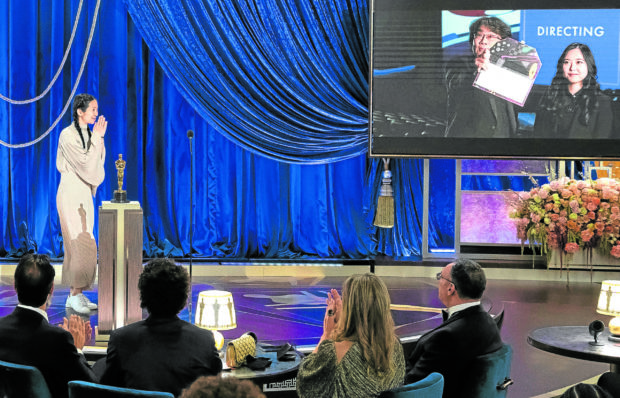
BIG MOMENT South Korean film director Bong Joon-ho (on screen) presents the Oscar for directing to China-born Chloe Zhao (left, on stage) during the live ABC telecast of the 93rd Academy Awards in Los Angeles, California. China native Zhao, director of Oscar best picture “Nomadland,” is the first Asian woman and only the second one ever to take home the trophy. —REUTERS
LOS ANGELES — “Nomadland,” the story of financially stretched van dwellers in the United States, won the Oscar best picture trophy and two other awards on a triumphant night for women that also saw a return to Hollywood glamour after a long pandemic shutdown.
In a major upset, Anthony Hopkins won best actor for his role as a man battling dementia in “The Father.” The Oscar had been widely expected to go to the late Chadwick Boseman for his final film, “Ma Rainey’s Black Bottom.”
China native Chloe Zhao was named best director for Searchlight Pictures’ “Nomadland,” making her the first Asian woman and only the second one ever to take home the trophy. Kathryn Bigelow was the first female director to win in the category in 2010.
In her speech, Zhao expressed her gratitude to the nomadic community for “teaching us the power of resilience and hope and reminding us what true kindness looks like.”
She competed this year against “Promising Young Woman” director Emerald Fennell, marking the first time two women were nominated in the category at the same time.
Born in China, Zhao lived in Beijing until age 14, when she went to boarding school in London and later finished high school in Los Angeles.
But her big moment was not seen live on television in China, where she has come under criticism. Posters on Chinese social media said she had insulted China in comments in the past.
Zhao’s comments when she won, however, were apolitical and evoked fond memories of her childhood in China, recalling a game she played with her father trying to memorize classic Chinese poems.
Red carpet
Frances McDormand, one of the few professionals in “Nomadland” in which several people played versions of themselves, won her third Oscar for best actress.
Social distancing forced a rethink of the ceremony, moving it to Union Station in downtown Los Angeles.
After strict COVID-19 testing and quarantine protocols, nominees and their guests, most of them mask-free, walked the red carpet. They sat in a cabaret-style room inside the Mission Revival-style rail station or chatted in an outdoor courtyard.
The prospect of all four acting honors going to people of color for the first time was not realized. But 14 women took home Oscars, including for sound (“Sound of Metal”), production design (“Mank”), original screenplay (“Promising Young Woman”) and documentary feature (“My Octopus Teacher”).
The national reckoning about systemic racism in the United States was also a theme following the murder conviction last week of a white police officer who knelt on the neck of Black man George Floyd.
“As a mother of a Black son, I know the fear that so many live with, and no amount of fame or fortune changes that,” said Regina King, who directed “One Night in Miami,” about four Black icons at the height of the 1960s civil rights movement.
Youn Yuh-jung, 73, won the best supporting actress Oscar for her role as a cantankerous grandmother in immigrant tale “Minari.” The first South Korean actress to win an Oscar joked about people mispronouncing her name, saying, “Tonight you are all forgiven. Me being here, I cannot believe it.”
Passionate plea
The ceremony for the highest honors in the movie business took place after a turbulent year for the industry that shuttered production and movie theaters for months and saw studios delay the release of some blockbusters by more than a year.
“This was indeed a hard year for everyone, but our love for movies helped to get us through it,” said King, opening the ceremony, which had no host for the third straight year.
McDormand made a passionate plea for people to return to theaters.
“One day, very soon, take everyone you know into a theater, shoulder to shoulder in that dark space, and watch every film that’s represented here,” she said.
Britain’s Daniel Kaluuya was named best supporting actor for his role as 1960s Black Panther activist Fred Hampton in “Judas and the Black Messiah.”
The movie “Soul,” the first from Disney’s Pixar to feature a Black lead character, won best animated feature, while Denmark’s “Another Round” took the prize for best international feature.
The winners were chosen in a secret ballot by the 9,000 members of the Academy of Motion Picture Arts and Sciences.